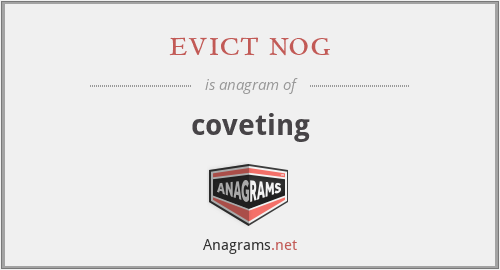What anagrams are available for coveting?
This page is about an anagram for the word evict nog that can be used in word games, puzzles, trivia and other crossword based board games.
evict nog
Translation
Find a translation for evict nog in other languages:
Select another language:
- - Select -
- 简体中文 (Chinese - Simplified)
- 繁體中文 (Chinese - Traditional)
- Español (Spanish)
- Esperanto (Esperanto)
- 日本語 (Japanese)
- Português (Portuguese)
- Deutsch (German)
- العربية (Arabic)
- Français (French)
- Русский (Russian)
- ಕನ್ನಡ (Kannada)
- 한국어 (Korean)
- עברית (Hebrew)
- Gaeilge (Irish)
- Українська (Ukrainian)
- اردو (Urdu)
- Magyar (Hungarian)
- मानक हिन्दी (Hindi)
- Indonesia (Indonesian)
- Italiano (Italian)
- தமிழ் (Tamil)
- Türkçe (Turkish)
- తెలుగు (Telugu)
- ภาษาไทย (Thai)
- Tiếng Việt (Vietnamese)
- Čeština (Czech)
- Polski (Polish)
- Bahasa Indonesia (Indonesian)
- Românește (Romanian)
- Nederlands (Dutch)
- Ελληνικά (Greek)
- Latinum (Latin)
- Svenska (Swedish)
- Dansk (Danish)
- Suomi (Finnish)
- فارسی (Persian)
- ייִדיש (Yiddish)
- հայերեն (Armenian)
- Norsk (Norwegian)
- English (English)
Definition
What does coveting mean?
- coveting
- The seven deadly sins, also known as the capital vices or cardinal sins, is a grouping and classification of vices within Christian teachings. Although they are not directly mentioned in the Bible, there are parallels with the seven things God is said to hate in the Book of Proverbs. Behaviours or habits are classified under this category if they directly give rise to other immoralities. According to the standard list, they are pride, greed, wrath, envy, lust, gluttony and sloth, which are contrary to the seven capital virtues. These sins are often thought to be abuses or excessive versions of one's natural faculties or passions (for example, gluttony abuses one's desire to eat). This classification originated with the Desert Fathers, especially Evagrius Ponticus. Evagrius' pupil John Cassian with his book The Institutes brought the classification to Europe, where it became fundamental to Catholic confessional practices as documented in penitential manuals, sermons such as "The Parson's Tale" from Chaucer's Canterbury Tales and artworks such as Dante's Purgatory where the penitents of Mount Purgatory are grouped and penanced according to their worst sin. Church teaching especially focused on pride, which was thought to be the root of all sin since it turns the soul away from God; and also on greed or covetousness. Both of these were to undercut other sins. The seven deadly sins are discussed in treatises and depicted in paintings and sculpture decorations on Catholic churches as well as older textbooks. The seven deadly sins, along with the sins against the Holy Ghost and the sins that cry to Heaven for vengeance, are taught especially in Western Christian traditions as things to be deplored.
Embed
Citation
Use the citation below to add this anagram to your bibliography:
Style:MLAChicagoAPA
"evict nog." Anagrams.net. STANDS4 LLC, 2024. Web. 22 May 2024. <https://www.anagrams.net/term/3174377>.



Discuss this coveting anagram with the community:
Report Comment
We're doing our best to make sure our content is useful, accurate and safe.
If by any chance you spot an inappropriate comment while navigating through our website please use this form to let us know, and we'll take care of it shortly.
Attachment
You need to be logged in to favorite.
Log In